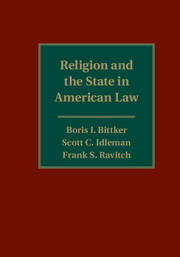Book contents
- Frontmatter
- Dedication
- Contents
- Preface
- 1 History and Introduction
- 2 Church and State in the Nineteenth Century
- 3 Religious Influences and Expressions in Law and Government
- 4 The Establishment Clause
- 5 The Free Exercise Clause
- 6 The Religious Test, Equal Protection, and Free Speech Clauses
- 7 The Definition of Religion
- 8 Church Property Disputes and Church Schisms
- 9 Contracts
- 10 Taxation
- 11 Employment
- 12 Land Use
- 13 Torts
- 14 Criminal Law and Process
- 15 Family Law
- 16 Public Education
- 17 Religious Symbolism on Government Property
- 18 Special Contexts: Prisons and the Military
- Appendix A Federal Constitutional Provisions
- Appendix B State Constitutional Provisions
- Appendix C Selected Federal Statutes 910
- Index
7 - The Definition of Religion
Published online by Cambridge University Press: 05 October 2015
- Frontmatter
- Dedication
- Contents
- Preface
- 1 History and Introduction
- 2 Church and State in the Nineteenth Century
- 3 Religious Influences and Expressions in Law and Government
- 4 The Establishment Clause
- 5 The Free Exercise Clause
- 6 The Religious Test, Equal Protection, and Free Speech Clauses
- 7 The Definition of Religion
- 8 Church Property Disputes and Church Schisms
- 9 Contracts
- 10 Taxation
- 11 Employment
- 12 Land Use
- 13 Torts
- 14 Criminal Law and Process
- 15 Family Law
- 16 Public Education
- 17 Religious Symbolism on Government Property
- 18 Special Contexts: Prisons and the Military
- Appendix A Federal Constitutional Provisions
- Appendix B State Constitutional Provisions
- Appendix C Selected Federal Statutes 910
- Index
Summary
The Current Lack of an Authoritative Definition
At most points in this book, it is essentially assumed that the belief system of a given claimant is in fact a “religion” within the meaning of the Free Exercise Clause or that the object of an alleged government establishment involves “religion” under the Establishment Clause. Much of the time, both for this book and for litigation, this turns out to be a fair and workable assumption because the belief systems at issue are often widely recognized as being religious. Occasionally, however, government officials are confronted with so novel or unconventional a belief system – typically as part of a religious freedom claim and disproportionately, it seems, in the prison context – that they must inquire whether or not the beliefs amount to a legally cognizable religion as a threshold matter. In the coming decades, as the diversity and idiosyncrasy of religious beliefs and practices in the United States continue to grow, such inquiries are likely only to increase.
As it turns out, “religion” appears to be one of the few key terms of the First Amendment, if not the only key term of that provision, that the contemporary Supreme Court has not authoritatively defined in a comprehensive or systematic manner. The most that the Court has said, in relatively dated cases of unknown or dubious precedential authority, is that religion involves a person's relationship to God or to “the ultimate mystery of the universe.” Conversely, the Court has explained that religion under the First Amendment does not encompass “purely secular considerations” or “philosophical and personal” beliefs such as those held by Henry David Thoreau, but this category of exclusion remains elusive as well.
Even among the multitude of other Article III judges past and present, only a modest number have ventured into this definitional abyss and yielded substantial (and sometimes quite different) definitions. To be sure, it is not uncommon for lower courts, when faced with an allegedly religious belief system that is unknown or extremely unusual, simply to assume that the beliefs are religious for sake of the litigation, particularly when the case is then resolved against the claimant on some other basis.
- Type
- Chapter
- Information
- Religion and the State in American Law , pp. 331 - 358Publisher: Cambridge University PressPrint publication year: 2015



